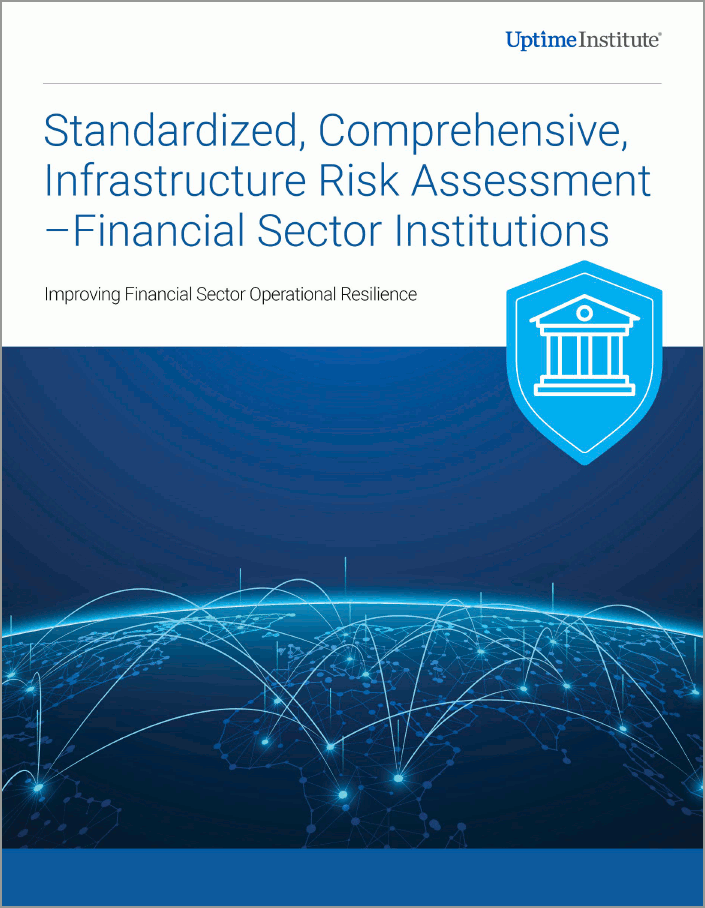金融行业机构标准化综合基础设施风险评估 (SCIRA-FSI)
为应对近期备受瞩目的停电和金融部门机构 (FSI) 部署的日益复杂的混合 IT 架构,金融部门监管机构正在实施有关运营弹性的监管要求,以鼓励采取更积极有效的风险管理实践。
Uptime Institute 认识到 FSI 社区日益增长的监管要求及其采用更复杂的混合 IT 基础设施,因此推出了 SCIRA-FSI 评估,以帮助金融部门组织评估其关键基础设施在企业自有数据中心、多租户数据中心服务提供商、云、IT 和管理服务提供商中的运营弹性。Uptime Institute 汇集了来自世界各地的 20 多家顶级金融机构,组成项目设计合作伙伴,共同建立标准化方法,帮助该行业更好地评估和缓解停机风险。
SCIRA-FSI 基于 Uptime Institute 对超过 20 个数据中心和常用金融部门标准的分析,包括其计划设计合作伙伴共享的内部评估协议、从 Uptime Institute 的异常事件报告数据库中收集的关于中断根本原因的 8,000 个数据点的常见 FSI 基础设施风险,以及 Uptime Institute 在全球 250 个 FSI 项目上的工作经验。
联系我们
欧盟数字运营弹性法案颁布16 1 月 2023
阅读更新
SCIRA-FSI 旨在应对行业挑战
行业挑战
资源限制阻止全球评估
虽然云、colo 和 SaaS 合作伙伴等外包 IT 服务提供商通常在供应商尽职调查期间接受风险评估,但内部合规部门和第三方监管机构通常要求对这些合作伙伴进行持续评估,以保持合规。
许多客户缺乏员工资源或内部流程和协议,无法在世界各地的服务提供商设施中持续全面地进行这些评估。
SCIRA-FSI 解决方案
始终如一的交付,遍及全球
Uptime Institute 员工遍布全球每个主要市场,我们的客户可以消除员工差旅要求,并确保他们满足内部和监管要求,对任何自有和运营或第三方关键基础设施进行标准化、一致的评估。
这不仅提供了方法和执行的一致性,而且确保了组织可以识别其 IT 资产中的中断风险。
行业挑战
满足合规和监管要求
90% 的设计合作伙伴表示,当地监管机构正在更积极地监控中断,并要求提供定期进行审计的证据。
FSI 必须在 IT 审计方面采取主动而非被动的立场,确保他们能够证明对自有和第三方基础设施进行一致、标准化和定期审计的证据。
SCIRA-FSI 解决方案
可信机构的持续评估
SCIRA-FSI 客户将接受 Uptime Institute 对其自有和运营站点以及第三方托管、云和 SaaS 站点的全面评估。
我们的评估旨在满足数据中心审计的监管要求,并向监管机构证明您正在采取积极主动的措施来衡量和降低整个 IT 领域的风险。
行业挑战
跨基础设施合作伙伴的标准化评估
在产品开发过程中,设计合作伙伴的反馈很明确——该部门正在寻找一个综合标准,该标准将 FSI 内部合规和监管要求纳入每个市场,同时实现全球 IT 领域的一致性。
SCIRA-FSI 解决方案
全球一致性综合Standard
我们的团队审查了 FSI 社区常用的 20 个以上标准的范围要素,并审查了众多 FSI 内部评估,以制定我们的综合标准。
结果是针对四个关键风险领域的标准化综合评估,由 142 个观察点组成,每个现场评估每个观察点的风险水平和影响严重性水平,让客户能够识别需要改进和降低风险的关键重点领域。
SCIRA-FSI 评估组件
研究中心特征
建造特点
建筑施工
拓扑和基础设施
电源系统
冷却系统
补充系统
安全系统
电信
设施运营
培训和人员发展
系统和计划管理
健康与安全
监督
准则合规
标准和认证
可持续性
能源效率
评估流程概述
在每次现场评估访问期间,Uptime Institute 顾问使用 SCIRA-FSI 评估协议来检查每个范围要素,并确定是否存在、存在但减轻或存在且未减轻对现场恢复能力的潜在风险。根据风险的规模和故障后果的影响严重性,对风险的影响进行审查和评估。
完成评估后,客户会收到一份关于其当前物理和运营风险的详细报告、一套解决这些风险的可行建议以及一份总结评估风险和建议的执行概述。
这种方法不仅有助于 FSI 积极预防停机事件,还作为监管备案要求的文档,以证明已经为支持关键业务服务的基础设施完成了全面的风险管理评估。

与世界领先的金融行业机构合作
我们的 SCIRA-FSI 产品代表了该行业的新产品,但我们花了数十年时间帮助领导 FSI 设计、构建、运营和评估其关键基础设施。
其他监管要求资源
请访问以下资源,了解有关金融部门监管机构正在实施的关于全球运营弹性和风险管理实践的监管要求的更多详细信息。
